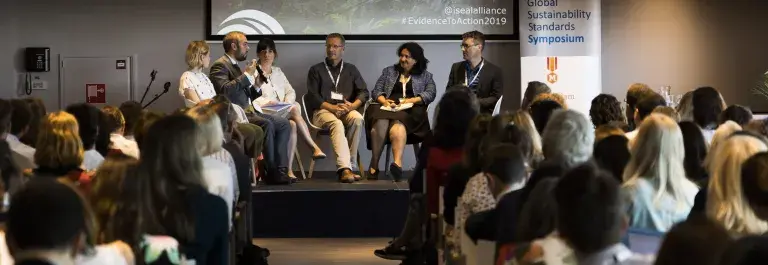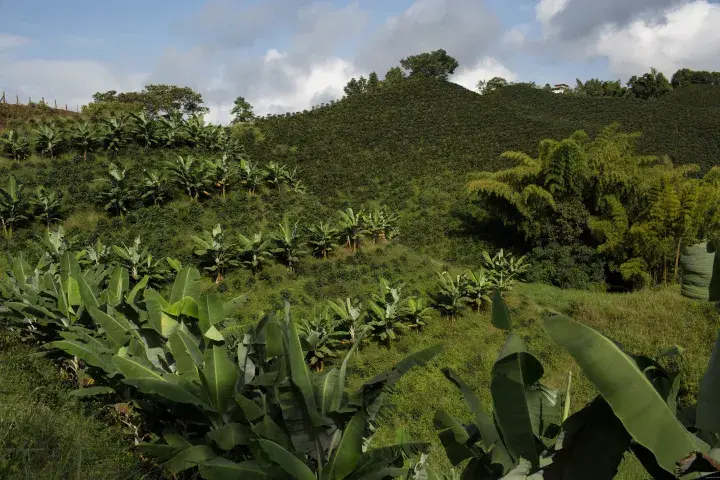In recent years, a wealth of evidence has been published on the manner in which sustainability initiatives can result in positive economic, social and environmental impacts. During the ISEAL Global Sustainability Standards Symposium, which took place on Tuesday 18 June, leaders in the fields of sustainability standards, business, government and civil society discussed the impact of sustainability standards in tackling some of the world’s biggest challenges such as deforestation and poverty.
What can research and evidence tell us about the factors that influence the impact of sustainability initiatives? And, what do these findings mean for companies and governments in terms of the further development of standards? These two questions took centre stage during the Global Sustainability Standards Symposium in The Hague.
Karin Kreider, Executive Director at ISEAL Alliance, and Birgitta Tazelaar, Deputy Director General International Cooperation of the Dutch Ministry of Foreign Affairs, opened the symposium with a plea for increased cooperation.
Kreider started with a brief retrospective on the development of sustainability standards that emerged in the 1990s. It was an innovative approach to encourage producers towards sustainable production through the consumer. ‘We know that certification programmes are not perfect. But it is clear that they offer a great deal of value to different actors and contribute to sustainability in many sectors: they remain the leading scalable, market-oriented approach to sustainability.’
Both Kreider and Tazelaar emphasised that sustainability standards are capable of making positive contributions, but that cooperation and more action are crucial to achieving greater impact.
Action-oriented approach helps address sustainability issues
In an inspiring keynote speech, Arjen Boekhold of Game Changer Unltd. (and, before that, Tony’s Chocolonely), shared his lessons and insights on an action-oriented approach. Boekhold emphasised the complexity of addressing sustainability issues as well as the fact that sometimes more courage is needed to take steps. ‘Nothing is perfect, but doing nothing is not an option,’ he said.
‘Further action is indeed vital,’ said Boekhold. ‘Although sustainability certification and standards have been around for thirty years, persistent issues such as child labour, deforestation and poverty still exist. Dare to be innovative, spring into action, celebrate the achievement of minor milestones, but do not be satisfied with anything less than the realisation of your mission.’
Sustainability initiatives are needed, even when they are not perfect
During the symposium, researchers and experts discussed ways in which sustainability standards can work to bring about change, how the impact of such standards and certifications can be measured and how these impact analyses can contribute to improving sustainability strategies.
One of the crucial questions that came up: to what extent are standards systems able to make a positive impact? Kristin Komives, Impacts Director at ISEAL Alliance, showed that the number of studies into the impact of certification is growing and that there is more and more evidence about what works and what doesn't. For example, analysis showed that certified farms perform better than non-certified farms on biodiversity conservation and tree cover loss. But is that enough? ‘We can now be confident that sustainability standards do have a positive impact on many sustainability outcomes. However, there is more to learn about the conditions under which they do and don't create impacts,’ said Komives.
That sustainability initiatives are needed, even when they are not perfect, was emphasised during the symposium. ‘With the evidence now available we’re learning more about where standards really add the most value, however, we cannot be complacent – it’s important that we continue to learn, innovate and improve,’ said Kreider.
Darrel Webber of the Roundtable on Sustainable Palm Oil closed the session by reminding us that we should not focus too much on short-term successes; addressing sustainability issues is a long-term effort, where performance improvement takes time.
New website Evidensia aims to bridge the gap between evidence and action
The conference concluded with the launch of a new website, www.evidensia.eco, a global repository for information on the impact and effectiveness of sustainability initiatives. Evidensia aims to bridge the gap between evidence and action. The site offers access to credible research and will help governments and the business community to make more informed decisions on sustainability issues such as climate, biodiversity and deforestation.
The Global Sustainability Standards Symposium was made possible in part by the Dutch Ministry of Foreign Affairs, Game Changer Unltd. and Tony’s Chocolonely.



